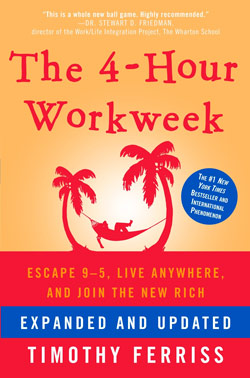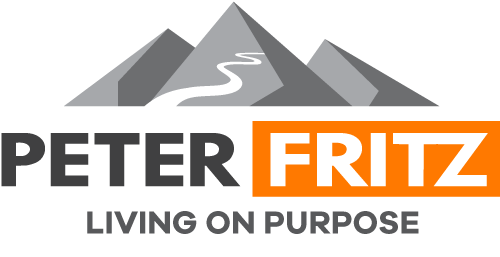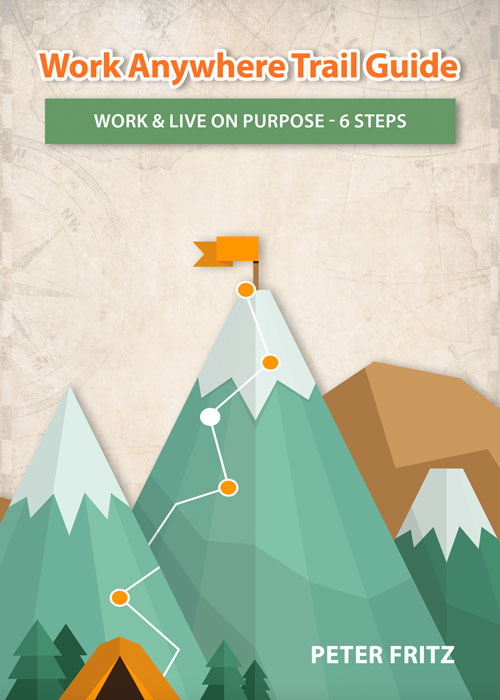[smart_track_player url=”http://traffic.libsyn.com/midlifetribe/Create_a_business_from_what_you_already_know_-_089.mp3″ background=”#f2f2f2″ social_gplus=”false” social_linkedin=”true” social_email=”true” ]
 Tim Ferris – author of The 4-Hour Work Week – has a lot to answer for. With one book, he brainwashed millions into thinking they could quit their job, join the new rich and live on a beach.
Tim Ferris – author of The 4-Hour Work Week – has a lot to answer for. With one book, he brainwashed millions into thinking they could quit their job, join the new rich and live on a beach.
By the time I read it, I’d already been infected for decades, thanks to my first mentor, Joe, with his huge house, his black Ferrari and his pink marble garage. So Tim’s book only amplified my long-held beliefs. I’d fantasized about running my own show since I was a spotty teenager; roaming the world in my private jet and counting money in inches. These thoughts dominated my formative years and drove me to work insanely hard when my energy and ignorance were at their peak.
Throughout my 20’s and 30s, I’d collapse in bed after 18 straight hours of working and learning, but still feel I hadn’t done enough. Even a ‘mild’ heart attack didn’t slow me down. Mind you, entrepreneurship was tougher back then. It demanded an appetite for risk and the inevitable procession of costly failures before you could breathe the clean air – assuming you could stick with it long enough to break through. With no Internet, getting the word out was the hardest part, and progress was slow.
I’ve freelanced for most of my life. I always knew that a job, on its own at least, was never going to give me what I wanted. So from my late teens onwards, I always had something on the side – either as a photographer or writer. Later, I moved into Web design, marketing, business ownership and property renovation.
I essentially quit my job about twenty ago and have been 100% freelance ever since – although a large portion of my work since ’97 has been for the one company. Over the last few years, I’ve witnessed an explosion in opportunities for just about anyone with passion, skill and ambition, to strike out on their own and develop a side-hustle – all while remaining gainfully employed.
It’s all possible thanks to the democratisation of media via the Internet, and the subsequent shift of power back to content creators. Using platforms like WordPress, YouTube, iTunes and Amazon, creative and knowledgeable individuals can fuse their content with a captive audience to generate a new source of income.
Resources to do this are everywhere but like any gold rush, traps abound for the unwary. The proliferation of information also creates another problem – too much conflicting information and very little structure.
The Internet is awash with ambitious people who are, at best, faking it till they make it. This phenomenon proliferates offline too; the Internet just amps it up to eleven because it’s everywhere.
I’ve been online for around 23 years, so I’ve seen a lot and I’ve spent a small fortune learning from mistakes. I don’t recommend learning that way – only an idiot wants to make all their own mistakes. As I’ve said before, you won’t live long enough to make them all.
But getting to the big question, “What can I do and how can I make money from it?” the answer lies in three other questions:
- What are you particularly passionate about? Put another way, what are the topics you enjoy thinking and talking about?
- What particular skills, talents or perspectives do you have?
- Where do you have some leverage or existing influence and credibility?
Think about these elements, then consider:
- Do any of these things converge so they can be combined into something you can talk about, illustrate or curate content around in some way?
- Is there a demand out there in the world – even a small niche – that would benefit from what you have to share around this topic?
Think of just about any subject; any area of interest and chances are, someone is earning a comfortable living from it. The business archetype you adopt also determines the revenue sources at your disposal. Here are some examples:
- Freelancer – writers, photographers, marketers, graphic designers, consultants, etc.
- Teacher – structured learning on specific areas of expertise
- Curator – sharing interesting and topical information created by others
- Leading Learner – sharing your journey as you learn something yourself
- Maker – a creative or manufacturer who produces tangible goods of your own design
- Retailer – selling other people’s goods
- Mediapreneur – a content creator (blogger, video maker or podcaster)
- Thought Leader – sharing ideas and concepts through publishing and speaking
Often, a side business will involve a combination of archetypes, and these will attract various revenue opportunities. More about these in a minute.
Find Your Intersection
So, the answer to “What can I do?” lies at the intersection between these questions. In my opinion, the best people to guide you towards this are a group of guys at the online small business training Website, fizzle.co. While there are plenty of teachers out there, none deliver the knowledge more concisely than these guys. Through their easy-to-follow roadmap, Corbett Barr, Chase Reeves and Steph Crowder (plus a gaggle of other very smart people), provide the structure you need to navigate the myriad options available to you.
The second Question, “How can I make money?” is easier to answer, but demands something few are willing to do: invest in the long game. You must persist, evolve and iterate as you go. Some people find the vein early but for most of us, it requires patience and ongoing refinement. Again, look to fizzle.co to guide you through their training videos and tasks. Their community forum of entrepreneurs is also enormously valuable.
Create as you learn. It’s the only way you’ll really understand what you’re doing and which areas to focus on.
There are tonnes of other resources I could recommend. Chris Guillebeau’s Side Hustle School and Pat Flynn’s Smart Passive Income are also fantastic. All of these resources are tremendously useful, and I can certainly vouch for their creators’ integrity and genuine desire to help you along your journey. My advice is to spend a month trying out all three and decide where you feel most comfortable, then learn as much as you can while you experiment.
Where does the money come from?
Regarding the revenue options, they tend to fall into these groups:
- The direct sale of tangible or intangible goods – either yours or someone else’s
- Publishing – you produce and sell your own books or guides (usually in eBook or Kindle format)
- Advertising revenue – where you share in the fees paid by advertisers to appear alongside your content (e.g. Google AdSense, Clickbank, etc.)
- Affiliate revenue – where you recommend (versus direct-sell) other people’s products and earn a small commission if they purchase offsite (e.g. Amazon Affiliates)
- Training – either online (video, email or downloadable content) or offline (in a one-to-one or group setting)
- Sponsorship – where brands pay you a fee to align with/appear in your content
- Consulting – where you deliver specialised one-on-one services for a fee
Amongst all these options lives an ideal fit for you. Fizzle has a brilliant decision matrix that helps you define these options for you – delivering a weighted score for each of them.
The choices available today are so vast; it’s easy to feel overwhelmed. Confronted by so much choice, it might seem easier not to try. But blazing your own trail is meant to be challenging. It should test you. The great thing though is you don’t need to bet the farm to have a go. The costs are small and manageable by just about anyone. If you doubt this, get a hold of Chris Guillebeau’s book, The $100 Startup. Another great choice is 100 Side Hustles.
There are things you know and talents you possess that you can share with the world. The opportunity to share those and make money from them wasn’t available 15 years ago. We really are living in a golden age, where the opportunity to work for yourself on your own terms – from anywhere in the world – is REAL.
If my daughter can do it…
 Three years ago, I attended a YouTube Content Lab with my then 13-year old daughter (a 100k+ YouTuber herself), along with 40 other participants. We spent around four hours working through a set of case studies – dissecting YouTube channels that were successful but had the potential for much bigger things.
Three years ago, I attended a YouTube Content Lab with my then 13-year old daughter (a 100k+ YouTuber herself), along with 40 other participants. We spent around four hours working through a set of case studies – dissecting YouTube channels that were successful but had the potential for much bigger things.
At the conclusion, each group got up and presented their findings, recommendations and long-term strategy for their particular study. Presenting on behalf of our group, I made a point that really sums up this era of tremendous opportunity. I told the assembled group that we were now engaged in something our parents could only dream about.
Here was a room full of people from age 13 to 50 – all doing something they love and sharing it with the world – living life on their own terms.
My daughter has another year of senior school to go, but she’s already in a position to strike out on her own, doing the work she loves. She won’t need a job, she won’t have a boss, and she’ll be able to work the hours she chooses, under the conditions she prefers. What’s more, she’ll be able to do it anywhere in the world. That’s because she invested the time, energy and creativity to build her knowledge, skills and credibility – mostly via YouTube.
Now, at just sixteen, she’s booked solid every week as a make-up artist and make-up instructor.
Other Resources
Any online business you develop will ultimately require reliable Web hosting. Even if you plan to build your audience on YouTube, Instagram, Facebook, Amazon or eBay, your goal should always be to create a place of your own on the Web where you have complete control over how it looks and what it contains.
Web Hosting
For Australian readers, I’d highly recommend Digital Pacific. I’ve used them for years for multiple clients, and they’ve always delivered outstanding service, faultless support and bulletproof hosting.
For those of you in the US, I recommend Bluehost. I’ve used them for quite a few projects, and the experience has been excellent.
WordPress Themes & Plugins
I’ve been building Websites for 23 years. My first was for a corporate diary manufacturer. I spent a few months holed up in their office trying to figure things out as I went. Most of it baffled the hell out of me but the idea that you could create something visible to the whole world excited me. It still does. Nowadays, it’s so much easier.
Like all mature industries, one solution always rises to the top, and when it comes to Web design, WordPress is the platform of choice.
I build all my clients’ sites on it, and almost all of them with the world’s best theme, Divi, from Elegant Themes. I’ve used them for years and recommend them without reservation. For less than $90 a year, you can access the toolset to create a Website that’s right up there with the best of them. Give them a try.
What now?
I’d like to tell you that building an online business is easy. It’s not. But compared to a traditional business and all the risks it entails (many of them financial), it’s unlikely to send you broke trying.
Social media and in-your-face advertising will have you believe it’s quick and easy – especially if you buy whatever they’re selling – but it’s neither. It takes time, patience, and a willingness to learn, screw up, and learn some more. The best part, though, is you get to pursue something that’s more than a business. You get to do something you actually care about.
![]() .
.
[ss_click_to_tweet tweet=”The choices for creating a business are so vast; it’s easy to feel overwhelmed, and it might seem easier not to try. But blazing your own trail is meant to be challenging. It should test you.” content=”The choices for creating a business are so vast; it’s easy to feel overwhelmed, and it might seem easier not to try. But blazing your own trail is meant to be challenging. It should test you.” style=”5″ link=”1″ via=”1″]
Other Useful Posts
6 steps to working & living on your terms
Affiliate Notice: If I recommend something to you (e.g. a book, software, a physical product, etc.), it’s because I’ve bought it, used it and benefited from it. Yes, I might get a small affiliate commission if you buy it, but it won’t cost you any extra. Besides, you don’t have to buy it through me, and if you don’t think it’ll help you, then don’t buy it from anywhere.
The Ultimate Goal – A Dedication to Jon James
Yesterday, a giant in my life called up to offer his final farewell. Today, he married his true love, Aurelia, before entering palliative care. He’s only 64, he’s athletic, and he's stronger than most 30-year-olds. But when cancer takes hold, it doesn’t care. Jonathon...
What are the first steps to starting a side business that makes you money?
[fusebox_track_player url="https://www.buzzsprout.com/1079927/5461972-what-are-the-first-steps-to-starting-a-side-business-ep-115.mp3?blob_id=22247092&download=true" title="What are the first steps to starting a side-business? - EP 115" social_linkedin="true"...
The purpose of purpose
[fusebox_track_player url="https://www.buzzsprout.com/1079927/5195959-the-purpose-of-purpose-ep-114.mp3?blob_id=20946406&download=true" title="The Purpose of Purpose - EP 114" social_linkedin="true" social_email="true" ]Recorded with SquadCastSubscribe: iTunes |...
Download the Guide





